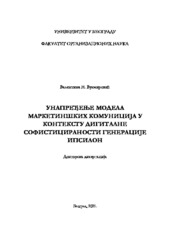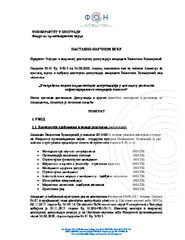Приказ основних података о дисертацији
Унапређење модела маркетиншких комуникација у контексту дигиталне софистицираности генерације ипсилон
The improvement of marketing communication models in the context of generation Y digital sophistication
| dc.contributor.advisor | Kostić-Stanković, Milica | |
| dc.contributor.other | Štavljanin, Velimir | |
| dc.contributor.other | Rakita, Branko | |
| dc.creator | Vukmirović, Valentina | |
| dc.date.accessioned | 2022-09-06T14:12:03Z | |
| dc.date.available | 2022-09-06T14:12:03Z | |
| dc.date.issued | 2021-09-11 | |
| dc.identifier.uri | https://eteze.bg.ac.rs/application/showtheses?thesesId=8700 | |
| dc.identifier.uri | https://fedorabg.bg.ac.rs/fedora/get/o:26247/bdef:Content/download | |
| dc.identifier.uri | https://plus.cobiss.net/cobiss/sr/sr/bib/39252233 | |
| dc.identifier.uri | https://nardus.mpn.gov.rs/handle/123456789/20672 | |
| dc.description.abstract | Циљ истраживања у докторској дисертацији је формулисање и емпиријско испитивање модела унапређења маркетиншких комуникација у контексту дигиталне софистицираности генерације ипсилон у Србији. Испитивању модела претходила је анализа литературних извора којом су идентификовани кључни технолошки и демографски трендови. На бази препознатих трендова, истакнуте су доминантне социолошке одлике циљног аудиторијума, њихове дигиталне компетенције и преференције у примени савремених технологија. Наведено је сагледано у функцији трансформације маркетиншке комуникације и унапређења њених традиционалних модалитета. Емпиријско истраживање реализовано је на пригодном узорку сачињеном од 641 студента основних студија Факултета организационих наука. У истраживању је коришћен структурирани упитник који су студенти попуњавали у две фазе. У првој фази испитаници су исказивали ставове у погледу дигиталне маркетиншке комуникације и коришћења друштвених медија. У другој фази, испитаници су изражавали ставове у односу на тврдње које је требало да процене њихове когнитивне, афективне и бихејвиоралне одговоре у односу на приказани маркетиншки садржај. Применом дескриптивне и инференцијалне статистике, добијени резултати су указали на то да припадници генерације ипсилон у Србији више вреднују маркетиншки садржај који се пласира путем друштвених медија и веб-сајтова него путем традиционалних средстава информисања, како са аспекта поузданости тако и са аспекта функционалности и апликативне вредности. Анализом предметне литературе, као и резултатима емпиријског истраживања, извршена је адаптација одабраног теоријског модела. Тиме је креиран концептуални модел испитивања перцепције и реакција аудиторијума о маркетиншкој комуникацији на друштвеним медијима. Каузални односи између посматраних композитних варијабли тестирани су применом моделовања помоћу структурних једначина. Тестирањем модела, уочен је значај који перципирана корисност и занимљивост садржаја, као и емоционални ставови корисника имају на поверење и задовољство маркетиншким садржајем. Утврђен је и директан утицај спремности корисника друштвених медија да генеришу кориснички садржај на јачину везе коју креирају са организацијом. Стеченим увидима се указује да перципирана корисност маркетиншког садржаја врши директан утицај на лојалност садржају. Последично, лојалност садржају организације директно утиче на намеру за куповином. Каузалним односима у моделу уочено је и да се намера за куповину реализује под утицајем емоционалних ставова изазваних маркетиншком комуникацијом, као и јачином остварене везе. Наведеним резултатима недвосмислено се указујe на потребу Унапређење модела маркетиншких комуникација у контексту дигиталне софистицираности генерације ипсилон да се традиционални, линеарни модели маркетиншке комуникације унапреде у контексту већег уважавања ставова и потреба дигитално софистицираног аудиторијума. | sr |
| dc.description.abstract | The main objective of this doctoral dissertation is proposing and empirically examining the research model of marketing communication improvement in the context of Serbian generation Y digital sophistication. Research model examination was preceded by literature review which provided the insights in key technological and demographic trends. On the basis of identified trends, dominant sociological characteristics of the target audience, their digital competencies and preferences regarding the use of modern technologies were highlighted. Stated issues were observed in the function of transforming marketing communication and ameliorating its traditional modalities. The empirical research was conducted on a convenience sample which consisted of 641 undergraduate students of the Faculty of Organizational Sciences. In this research, a structured questionnaire was employed. The questionnaire was completed in two phases. In the first phase, the respondents expressed their attitudes regarding digital marketing communication and social media use. In the second phase, the respondents expressed their attitudes toward claims which were supposed to assess their cognitive, affective, and behavioral responses to the marketing content presented. The results of the research, using descriptive and inferential statistics, indicated that members of generation Y in Serbia perceive marketing content distributed on social media and websites as more valuable than the one distributed on traditional media, both in terms of reliability and functionality as well as its application value. On the basis of literature review insights, as well as the results of the empirical research, the selected theoretical model was adapted. Therefore, a conceptual model of examining the perception and reactions of the audience about marketing communication on social media was created. The causal relationships between the observed composite variables were tested using structural equations modeling. By testing the model, the importance of perceived usefulness and interestingness of content, as well as the emotional attitudes of users to trust and satisfaction with companies' marketing content was noticed. The direct impact of social media users' readiness to generate user content on the strength of the connection created with the organization, was also determined. Obtained insights indicated that the perceived usefulness of the content has a direct impact on content loyalty. Consequently, customer content loyalty directly affects their product purchase intention. The causal relations in the model also showed that the intention to buy is realized under the influence of emotional attitudes caused by marketing communication, as well as the strength of the realized connection. These research results unequivocally indicate the need to improve traditional, linear models of marketing communication in the context of greater respect for the attitudes and needs of a digitally sophisticated audience. Given the relatively homogeneous structure of the selected convenience sample, future research should consider including heterogeneous sample composed of generation Y members in Serbia. A heterogeneous sample and continuously conducted research could provide additional insights into the observed phenomenon, that both the scientific community and marketing practitioners would benefit of. | en |
| dc.format | application/pdf | |
| dc.language | sr | |
| dc.publisher | Универзитет у Београду, Факултет организационих наука | sr |
| dc.rights | openAccess | en |
| dc.source | Универзитет у Београду | sr |
| dc.subject | модели маркетиншке комуникације | sr |
| dc.subject | Marketing communication models | en |
| dc.subject | унапређење | sr |
| dc.subject | дигитална софистицираност аудиторијума | sr |
| dc.subject | генерација ипсилон у Србији | sr |
| dc.subject | Improvement | en |
| dc.subject | Digital sophistication of the auditorium | en |
| dc.subject | Generation Y in Serbia | en |
| dc.title | Унапређење модела маркетиншких комуникација у контексту дигиталне софистицираности генерације ипсилон | sr |
| dc.title.alternative | The improvement of marketing communication models in the context of generation Y digital sophistication | en |
| dc.type | doctoralThesis | |
| dc.rights.license | ARR | |
| dc.identifier.fulltext | http://nardus.mpn.gov.rs/bitstream/id/145588/Disertacija_12409.pdf | |
| dc.identifier.fulltext | http://nardus.mpn.gov.rs/bitstream/id/145589/VukmirovicReferat.pdf | |
| dc.identifier.rcub | https://hdl.handle.net/21.15107/rcub_nardus_20672 |



